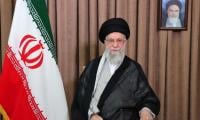Afghan-Taliban talks
As was expected, the two days of talks between Taliban representatives and Afghan politicians in Doha, Qatar that ended this past Sunday produced no outcome. The closed door talks hosted by the Qatar foreign ministry opened up the possibility of a resolution to the 13-year-old civil war in Afghanistan. The
By our correspondents
May 05, 2015
As was expected, the two days of talks between Taliban representatives and Afghan politicians in Doha, Qatar that ended this past Sunday produced no outcome. The closed door talks hosted by the Qatar foreign ministry opened up the possibility of a resolution to the 13-year-old civil war in Afghanistan. The talks came as increased fighting after the withdrawal of most Nato troops from the country led to the Taliban launching a new offensive in northern Afghanistan. None of the officials, who emerged smiling and sharing jokes after the peace talks, spoke to the media through official channels. It has been reported that a ceasefire was discussed. However, apparently a disagreement over the presence of US troops in the country was made quite clear. A Taliban participant said they had presented a set of written demands and conditions among the participants. They said the Afghan government had asked them to stop fighting and obey the Afghan constitution. This was a non-starter since US troops are still present in Afghanistan. The Afghan government claimed that only foreign trainers were left, who would leave if the Taliban stopped fighting. Officials from the US, China and Pakistan were said to have attended the talks, with Pakistan officially announcing support for the peace talks.
The next round of talks is scheduled in the UAE next month. However, after reading some of the statements coming out of the talks one is tempted to ask: did they actually have talks or was it just a social call? A Taliban statement called it a ‘research conference’ where each member came in their ‘individual capacity’. The Afghan presidential spokesman also insisted that members of the High Peace Council attended the talks in their ‘personal capacity only’ and that they “have no expectations.” Perhaps both sides are trying to establish common ground before raising hopes after the embarrassing attempts at talks in 2013. Then, amidst a discussion that talks were imminent, the Taliban opened an office in Qatar for the ‘Islamic Emirate of Afghanistan’ and raised their flag. Afghan anger at the raising of the flag prompted a swift closure to the talks process. For now, the major stumbling block appears to be foreign troops in Afghanistan. But the Afghan government appears caught between a rock and a hard place. What guarantee is there that the Taliban will be as amenable once US troops are out? Foreign troops remain the only trump card Afghan President Ghani appears to possess. A compromise will need to be found soon if the much-needed Afghan peace process is to go ahead.
The next round of talks is scheduled in the UAE next month. However, after reading some of the statements coming out of the talks one is tempted to ask: did they actually have talks or was it just a social call? A Taliban statement called it a ‘research conference’ where each member came in their ‘individual capacity’. The Afghan presidential spokesman also insisted that members of the High Peace Council attended the talks in their ‘personal capacity only’ and that they “have no expectations.” Perhaps both sides are trying to establish common ground before raising hopes after the embarrassing attempts at talks in 2013. Then, amidst a discussion that talks were imminent, the Taliban opened an office in Qatar for the ‘Islamic Emirate of Afghanistan’ and raised their flag. Afghan anger at the raising of the flag prompted a swift closure to the talks process. For now, the major stumbling block appears to be foreign troops in Afghanistan. But the Afghan government appears caught between a rock and a hard place. What guarantee is there that the Taliban will be as amenable once US troops are out? Foreign troops remain the only trump card Afghan President Ghani appears to possess. A compromise will need to be found soon if the much-needed Afghan peace process is to go ahead.
-
 New Observatory Sends 800,000 Asteroid Alerts In One Night
New Observatory Sends 800,000 Asteroid Alerts In One Night -
 Cher’s Son Elijah Blue Allman Apprehended On Two Counts Of Assault At Elite Prep School
Cher’s Son Elijah Blue Allman Apprehended On Two Counts Of Assault At Elite Prep School -
 Beatrice, Eugenie Now Face Andrew, Sarah's ‘nightmares’: 'They're Hugely Conflicted'
Beatrice, Eugenie Now Face Andrew, Sarah's ‘nightmares’: 'They're Hugely Conflicted' -
 X Debuts Topic Filtering To Help Users Shape Their ‘For You’ Recommendations
X Debuts Topic Filtering To Help Users Shape Their ‘For You’ Recommendations -
 Scientists Built World's First Computer That Learns Like Human Brain
Scientists Built World's First Computer That Learns Like Human Brain -
 Robert Carradine’s Daughter Makes Bombshell Confession As Actor's Death Cause Confirmed
Robert Carradine’s Daughter Makes Bombshell Confession As Actor's Death Cause Confirmed -
 Beatrice, Eugenie Put On Blast: ‘Only Nitwits Wouldn’t See An Association With A Pedophile As Toxic’
Beatrice, Eugenie Put On Blast: ‘Only Nitwits Wouldn’t See An Association With A Pedophile As Toxic’ -
 OpenAI Defies Industry Pressure, Secures Guardrails Under New US Defense Department Pact
OpenAI Defies Industry Pressure, Secures Guardrails Under New US Defense Department Pact -
 'Sinners' Delroy Lindo Breaks Silence On BAFTA's Tourette’s Incident At NAACP Image Awards
'Sinners' Delroy Lindo Breaks Silence On BAFTA's Tourette’s Incident At NAACP Image Awards -
 Billy Joel Admits Cancelling Of Tour Due To Brain Disorder 'sounds A Lot Worse' Than It Is
Billy Joel Admits Cancelling Of Tour Due To Brain Disorder 'sounds A Lot Worse' Than It Is -
 US And Israeli Strikes On Iran: Everything You Need To Know
US And Israeli Strikes On Iran: Everything You Need To Know -
 US Strikes On Iran Ignite Emergency Push For Powers Legislation: Report
US Strikes On Iran Ignite Emergency Push For Powers Legislation: Report -
 Kelly Osbourne's Mom Sharon Receives 'shut Up' Call Accepting An Award For Late Hubby?
Kelly Osbourne's Mom Sharon Receives 'shut Up' Call Accepting An Award For Late Hubby? -
 Claude Overtakes ChatGPT On Apple App Store After Pentagon Dispute
Claude Overtakes ChatGPT On Apple App Store After Pentagon Dispute -
 What Happened To Ayatollah Ali Khamenei's Family During US -Israel Attack On Iran
What Happened To Ayatollah Ali Khamenei's Family During US -Israel Attack On Iran -
 BRIT Awards 2026 Winners Revealed
BRIT Awards 2026 Winners Revealed



